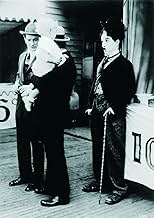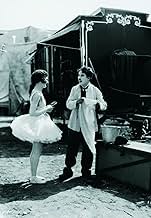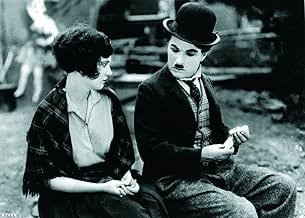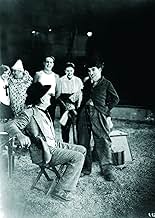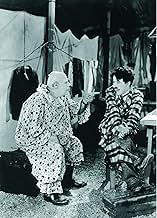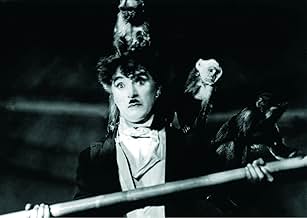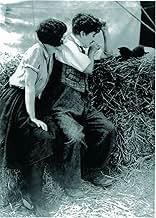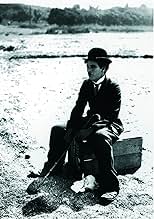AVALIAÇÃO DA IMDb
8,1/10
38 mil
SUA AVALIAÇÃO
O vagabundo Carlitos é confundido com um ladrão e vai se refugiar num circo, onde se transforma na atração principal e revolta-se contra o tirânico proprietário do circo.O vagabundo Carlitos é confundido com um ladrão e vai se refugiar num circo, onde se transforma na atração principal e revolta-se contra o tirânico proprietário do circo.O vagabundo Carlitos é confundido com um ladrão e vai se refugiar num circo, onde se transforma na atração principal e revolta-se contra o tirânico proprietário do circo.
- Prêmios
- 3 vitórias no total
Charles Chaplin
- A Tramp
- (as Charlie Chaplin)
Al Ernest Garcia
- The Circus Proprietor and Ring Master
- (as Allan Garcia)
Tiny Sandford
- The Head Property Man
- (as Stanley J. Sandford)
Albert Austin
- Clown
- (não creditado)
Chester A. Bachman
- Cop
- (não creditado)
Eugene Barry
- Cop
- (não creditado)
Jack Bernard
- Man in Circus Audience
- (não creditado)
Stanley Blystone
- Cop
- (não creditado)
Heinie Conklin
- Clown
- (não creditado)
Toraichi Kono
- Man in Circus Audience
- (não confirmado)
- (não creditado)
H.L. Kyle
- Man in Circus Audience
- (não creditado)
Betty Morrissey
- The Vanishing Lady
- (não creditado)
Avaliações em destaque
Perhaps this doesn't have quite the reputation of Charlie Chaplin's greatest movies, but it is very entertaining, and it's a good showcase both for his comic genius and also for his skill as a film-maker. It's full of very funny routines along with plenty of action, with enough of a story to make you care about the characters, too.
The setting in "The Circus" certainly gives Chaplin a lot of ready-made material, and he makes the most of it, coming up with hilarious routines involving everything from a hall of mirrors to a lion. His 'Tramp' character gets involved in all kinds of amusing predicaments that involve several other interesting characters. Most of it keeps a pretty light tone, which makes the serious parts that much more effective. And there are several sequences which, though perhaps not as well known as some of the scenes from other Chaplin films, are quite funny and creative.
With plenty of humor and Chaplin's trademark sympathetic characters, this is a very enjoyable feature for anyone who appreciates classic comedy.
The setting in "The Circus" certainly gives Chaplin a lot of ready-made material, and he makes the most of it, coming up with hilarious routines involving everything from a hall of mirrors to a lion. His 'Tramp' character gets involved in all kinds of amusing predicaments that involve several other interesting characters. Most of it keeps a pretty light tone, which makes the serious parts that much more effective. And there are several sequences which, though perhaps not as well known as some of the scenes from other Chaplin films, are quite funny and creative.
With plenty of humor and Chaplin's trademark sympathetic characters, this is a very enjoyable feature for anyone who appreciates classic comedy.
When Charlie Chaplin first plods onto screen in The Circus, he has his back to us. Unusual for any other leading man, but Chaplin was such a legendary icon, even now when he was only making one film every few years, his mere outline was enough to announce his presence. But with such a status came a certain weariness, and The Circus is one of a number of pictures in which Chaplin lampoons the whole process that made his name.
A lot of the business in The Circus is about Chaplin's ability to be naturally comical, and the shortcomings of being an employed comedian. It's interesting how, more than any Chaplin picture that came before or after, The Circus seems to be putting us (the audience) into the little tramp's experience. There are a number of point of view shots, and often characters addressing Charlie are virtually staring into the lens, as opposed to the profile shots he usually stuck to. Even the shots in the ring do not give us the perspective of the big top crowd, and instead the camera looks in on the action from the performers' entrance. The camera is always in the sawdust and never the stalls. This is, from its very first scene, clearly a backstage movie. It may seem a subtle shift but Chaplin is certainly drawing us more to focusing on the lives of circus folk and away from thinking of the circus as entertainment. It's notable too that Chaplin's best comedy vignettes occur outside the big top.
It seems Chaplin was increasingly giving larger and more substantial roles to his leading ladies. Oddly however, while Merna Kennedy plays the most fleshed-out female lead of any Chaplin picture to date, she seems less of a focus for the camera, which barely lingers on her. From what we can see she is not bad, but she lacks the calm dignity of Edna Purviance and Georgia Hale, or at least does not get to display such a thing. More reassuringly, there is a decent-sized part for Chaplin regular Henry Bergman as an old clown. Bergman had been a comedy performer for decades, and had even worked in a real circus in his youth, so he certainly knew what this role was about. With some heartfelt facial acting amongst all his usual huffing and puffing about, it is probably his finest performance.
If The Circus is known for anything, it tends to be the very fact that it is not as well known as many of Chaplin's other features. Chaplin himself does not even mention it in his autobiography (the imaginatively titled "My autobiography" – but then again, being the legend that he is, he doesn't need a punchy title to promote his own name). But far from neglecting the work, Chaplin gave it surely his neatest and most delicate update-job when he came to overhaul all his silent features for re-release in the 60s and 70s. Unlike The Kid and A Woman of Paris, from which he cut several scenes, and The Gold Rush, which he all but butchered in 1943, The Circus is left intact. He also treats it to its own theme song, under which the opening credits are inter-cut with shots of Kennedy on the trapeze, creating the most tender and lyrical opening of all his pictures.
A lot of the business in The Circus is about Chaplin's ability to be naturally comical, and the shortcomings of being an employed comedian. It's interesting how, more than any Chaplin picture that came before or after, The Circus seems to be putting us (the audience) into the little tramp's experience. There are a number of point of view shots, and often characters addressing Charlie are virtually staring into the lens, as opposed to the profile shots he usually stuck to. Even the shots in the ring do not give us the perspective of the big top crowd, and instead the camera looks in on the action from the performers' entrance. The camera is always in the sawdust and never the stalls. This is, from its very first scene, clearly a backstage movie. It may seem a subtle shift but Chaplin is certainly drawing us more to focusing on the lives of circus folk and away from thinking of the circus as entertainment. It's notable too that Chaplin's best comedy vignettes occur outside the big top.
It seems Chaplin was increasingly giving larger and more substantial roles to his leading ladies. Oddly however, while Merna Kennedy plays the most fleshed-out female lead of any Chaplin picture to date, she seems less of a focus for the camera, which barely lingers on her. From what we can see she is not bad, but she lacks the calm dignity of Edna Purviance and Georgia Hale, or at least does not get to display such a thing. More reassuringly, there is a decent-sized part for Chaplin regular Henry Bergman as an old clown. Bergman had been a comedy performer for decades, and had even worked in a real circus in his youth, so he certainly knew what this role was about. With some heartfelt facial acting amongst all his usual huffing and puffing about, it is probably his finest performance.
If The Circus is known for anything, it tends to be the very fact that it is not as well known as many of Chaplin's other features. Chaplin himself does not even mention it in his autobiography (the imaginatively titled "My autobiography" – but then again, being the legend that he is, he doesn't need a punchy title to promote his own name). But far from neglecting the work, Chaplin gave it surely his neatest and most delicate update-job when he came to overhaul all his silent features for re-release in the 60s and 70s. Unlike The Kid and A Woman of Paris, from which he cut several scenes, and The Gold Rush, which he all but butchered in 1943, The Circus is left intact. He also treats it to its own theme song, under which the opening credits are inter-cut with shots of Kennedy on the trapeze, creating the most tender and lyrical opening of all his pictures.
I enjoyed this a lot more the second time when I could see it on a very clear DVD print. I don't know why that would make a difference with the story, but it did as I found it very good for the entire distance, although that's just a scant 69 minutes.
In the story, Charlie Chaplin does his normally-great physical slapstick so well that he accidentally becomes a hit at the circus, which is run by a nasty man (Allan Garcia) who regularly beats his sweet step-daughter, played by a very pretty Merna Kennedy. Charlie, of course, gets smitten by her and comes to her rescue.
This movie has a different kind of ending that what you'd normally see for a comedy but it's inspiring as Chaplin performs a noble deed. (However, Kennedy's character is in question as she seems satisfied to marry either of two men. Huh?)
Chaplin's timing and clever slapstick routines never fail to amaze me. Even though silent films aren't seen by many people these days, it's works of art like this that will endure forever. This is not of one of Chaplin's more famous movies.....but it should be. I think it's one of his best.
In the story, Charlie Chaplin does his normally-great physical slapstick so well that he accidentally becomes a hit at the circus, which is run by a nasty man (Allan Garcia) who regularly beats his sweet step-daughter, played by a very pretty Merna Kennedy. Charlie, of course, gets smitten by her and comes to her rescue.
This movie has a different kind of ending that what you'd normally see for a comedy but it's inspiring as Chaplin performs a noble deed. (However, Kennedy's character is in question as she seems satisfied to marry either of two men. Huh?)
Chaplin's timing and clever slapstick routines never fail to amaze me. Even though silent films aren't seen by many people these days, it's works of art like this that will endure forever. This is not of one of Chaplin's more famous movies.....but it should be. I think it's one of his best.
The Circus is probably Chaplin's most underrated film. It is (easily) one of the funniest movies ever, and the inventiveness of such shots as the Mirror Maze scene and the closing sequence are nothing less than brilliant. What separates Chaplin from other comedian filmmakers is his ability to evoke a sense of pity and/or sympathy for his character. How can you watch the closing scenes of this film and, even after all of the laughter, NOT sense a bit of melancholia welling up in your heart? Truly one of the greats.
The Little Tramp is chased into a circus tent during a performance; his antics prove funnier than those of the clowns, and the ringmaster hires him for the show.
When a comedian plays a character who is inadvertently hilarious, it can seem narcissistic: just check out Jerry Lewis's "The Errand Boy" where Lewis has his supporting cast praise the comic genius of the character played by Jerry Lewis. Despite this danger, and despite Chaplin's off-screen egotism, the premise plays beautifully, especially since The Little Tramp (though not Chaplin) is such a terrible comedian when he's trying to be one. My favorite moment is when the ringmaster demands the auditioning Tramp to be funny right that instant: the Tramp grins and shyly dances around a bit, gingerly falls down, puts his cane between his legs and meekly lifts himself back up. "Terrible!" roars his would-be employer.
This film has more self-awareness over comedy conventions that any other Chaplin I know of. The Tramp ineptly (but hilariously) performs a couple of standard comedy routines with the other circus clowns. Later, there's a funny twist to the old banana peel gag; and near the end he crashes into an old general store, looking as if he's thrust himself back into his old Keystone days. This is Chaplin's last true silent film, and the Keystone moment feels like a nostalgic farewell to the past.
"The Circus" is funny throughout, but the opening scenes are probably the best. There's a marvelous funhouse sequence and a priceless routine where The Tramp pretends to be a motorized dummy. (Has anyone seen the Swiss clock routine from "Your Show of Shows"?) He also falls in love with the ringmaster's cruelly treated daughter, which leads to a poignant ending.
I enjoyed the music, which Chaplin composed for this film in 1969. His scores are always repetitive; but they're also sweet and funny and they enhance the action. I could have done without the title-sequence song (which he sings himself)—something about looking up at rainbows. Otherwise, this comedy is near-perfect and holds its own against Chaplin's even greater features, "The Gold Rush," "City Lights" and "Modern Times."
When a comedian plays a character who is inadvertently hilarious, it can seem narcissistic: just check out Jerry Lewis's "The Errand Boy" where Lewis has his supporting cast praise the comic genius of the character played by Jerry Lewis. Despite this danger, and despite Chaplin's off-screen egotism, the premise plays beautifully, especially since The Little Tramp (though not Chaplin) is such a terrible comedian when he's trying to be one. My favorite moment is when the ringmaster demands the auditioning Tramp to be funny right that instant: the Tramp grins and shyly dances around a bit, gingerly falls down, puts his cane between his legs and meekly lifts himself back up. "Terrible!" roars his would-be employer.
This film has more self-awareness over comedy conventions that any other Chaplin I know of. The Tramp ineptly (but hilariously) performs a couple of standard comedy routines with the other circus clowns. Later, there's a funny twist to the old banana peel gag; and near the end he crashes into an old general store, looking as if he's thrust himself back into his old Keystone days. This is Chaplin's last true silent film, and the Keystone moment feels like a nostalgic farewell to the past.
"The Circus" is funny throughout, but the opening scenes are probably the best. There's a marvelous funhouse sequence and a priceless routine where The Tramp pretends to be a motorized dummy. (Has anyone seen the Swiss clock routine from "Your Show of Shows"?) He also falls in love with the ringmaster's cruelly treated daughter, which leads to a poignant ending.
I enjoyed the music, which Chaplin composed for this film in 1969. His scores are always repetitive; but they're also sweet and funny and they enhance the action. I could have done without the title-sequence song (which he sings himself)—something about looking up at rainbows. Otherwise, this comedy is near-perfect and holds its own against Chaplin's even greater features, "The Gold Rush," "City Lights" and "Modern Times."
Você sabia?
- CuriosidadesIn the 1969 reissue, the 80-year-old Sir Charles Chaplin sang the title song.
- Erros de gravaçãoAfter the tramp washes the shaving cream from his face, he dries himself with a towel, but the towel never touches his face. (This is probably so that it won't mess up the stage makeup.)
- Citações
The Circus Proprietor and Ring Master: Go ahead and be funny.
- Versões alternativasCharles Chaplin replaced the original credits of this film when he reissued it in 1969. In their place, there is an opening scene featuring Merna Kennedy on the trapeze while Chaplin sings a song, then the image fades to the credits of that version with no cast nor technical credits.
- ConexõesFeatured in The Circus: Premiere (1928)
Principais escolhas
Faça login para avaliar e ver a lista de recomendações personalizadas
Detalhes
- Data de lançamento
- País de origem
- Centrais de atendimento oficiais
- Idiomas
- Também conhecido como
- The Circus
- Locações de filme
- Glendale, Califórnia, EUA(ending exterior scenes - the circus wagons depart south on Verdugo Rd. from Glenoaks Blvd.)
- Empresa de produção
- Consulte mais créditos da empresa na IMDbPro
Bilheteria
- Orçamento
- US$ 900.000 (estimativa)
- Faturamento bruto mundial
- US$ 33.854
- Tempo de duração1 hora 12 minutos
- Cor
- Mixagem de som
- Proporção
- 1.33 : 1
Contribua para esta página
Sugerir uma alteração ou adicionar conteúdo ausente


